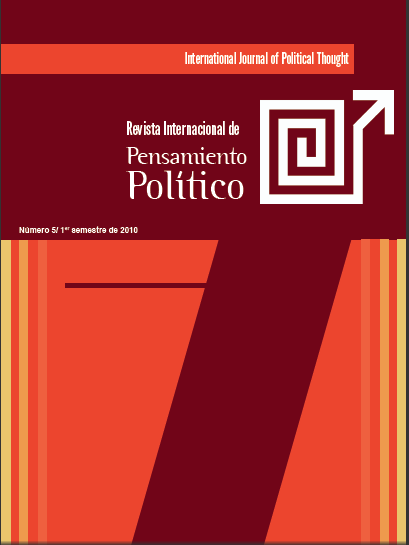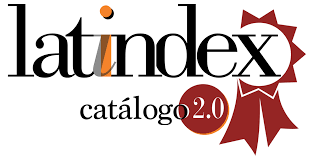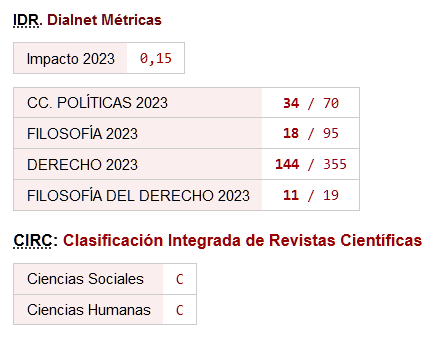El retorno de Arquímedes o el poder de la imaginación a la calle: la participación fraccionada: una técnica asociativo-decisional para un activismo político inédito
DOI:
https://doi.org/10.46661/revintpensampolit.1805Keywords:
Political Activism, Ecocitizenship, Association, Participation, DemocracyAbstract
La participación fraccionada es una innovadora técnica asociativo-decisional basada en la acción combinada de determinados principios (desagregación-agregación, cooperación, complementariedad, publicidad, conectividad, afectación directa, ecociudadanía, aquiescencia pactada, cohabitación cooperativa, rol variable, liderazgo abierto, confidencialidad, ecociveocio y ecociveturismo). Constituye un equipamiento político virtual autoinstructivo que propicia una nueva dimensión del asociacionismo (asociacionismo blando) y de la participación (participación a la carta) para reforzar la democracia, facilitar su ejercicio y extenderlo más allá del ámbito Estado-nacional. La instancia de participación fraccionada (IPF) es el prototipo de herramienta política para el ejercicio de la participación fraccionada. La IPF, dotada de la aplicación de software ad hoc que requiere y progresivamente adaptada a las necesidades de cada época, lugar y circunstancias, puede llegar a convertirse en un útil y generalizado instrumento político para el ejercicio de la ecociudadanía. Dado que opera merced a la generación permanente de procesos abiertos y espontáneos de agregación sucesiva de impulsos complementarios de participación, esta técnica también podría denominarse participación agregativa o participación por impulsos complementarios.
--------------------------------------------------------------------
Divided participation is an associative and decision-making innovative technique based on the combined action of certain principles (division and grouping, cooperation, complementarity, publicity, connectivity, direct affectation, ecocitizenship, declared acquiescence, cooperative cohabitation, variable roll, open leadership, confidentiality, «ecociveocius» and «ecociveturism»). The DPM is a virtual and self-instructive political equipment that will make possible a new kind of political association (soft associationism) and political participation (participation á la carte) in order to strengthen democracy, make its exercise easier, and extend it beyond the State-national framework. The «tool for divided participation» (TDP) is the prototype of a virtual and interactive political tool to practice «divided participation». Once it I provided with the software ad hoc that it needs and it becomes gradually known and adapted to the demands of each time, place and circumstances, the TDP will become a useful and widespread political instrument in the exercise of eco-citizenship. As it operates through the generation of permanent and open processes and the spontaneous aggregation of successive complementary impulses of participation, divided participation may also be called aggregate participation, or participation by complementary impulses.
Downloads
References
Barber, B. (1984): Strong Democracy, Participatory Politics for a New Age, Berkeley, Los Ángeles, University of California Press. Hay traducción española de Mora, J.J.; (2004): Democracia fuerte, Córdoba, Ed. Almuzara.
Dahl, R. A. (1997): La democracia y sus críticos, Barcelona, Paidós.
Rasilla, L. (2010): La participación fraccionada: Una técnica asociativodecisional de nueva generación para la autoformación y la acción políticas en el horizonte de una ciudadanía mundial. Disponible en .
Rasilla, L. (2009): La activación de plataformas 3.0 de autoformación y acción ecociudadanas: el papel de las Universidades y de las ONG. Publicaciones intersurdelibre@cceso .
Rasilla, L. (2004): «La observación y el control ecociudadano de los asuntos públicos como modalidad de aprendizaje y ejercicio generalizado del derecho de participación política», en Soriano R.; Alarcón, C.; Mora, J.J. (dirs. edición), (2004): Repensar la Democracia, Sevilla, Aconcagua, pp. 165188.
Rifkin, J. (1995): The End of the Work: The Decline of the Global Labor Force and the Dawn of the Post-Market Era, Nueva York, Tarcher/Putnam. (Traducción al español, 1997: El fin del trabajo, Barcelona, Paidós).
Rifkin, J. (2000): The Hydrogen Economy, New York, Penguin Putnam Inc. (Traducción al español de Ramón Vilá Vermis, 2002: La Economía del Hidrógeno, Barcelona, Paidós.
Soriano, R.; Rasilla, L. (2002): Democracia vergonzante y ciudadanos de perfil, Granada, Ed. Comares. La editorial Sepha
Downloads
Published
How to Cite
Issue
Section
License
Copyright (c) 2016 Revista Internacional de Pensamiento Político

This work is licensed under a Creative Commons Attribution-NonCommercial-ShareAlike 4.0 International License.
Open access policy
Free and open access is allowed to any interested party to all the contents of the journal issues, free of charge, being able to print and transfer all the articles, with the only condition of specifying the source and authorship.
The journal: a) does not charge authorship costs for the processing of articles or for their submission, b) maintains copyright for authors without restrictions, c) facilitates authors to keep their publication rights without limitations.
The International Journal of Political Thought is an original work of the Laboratory of Political Ideas and Practices of the Pablo de Olavide University. All articles included in the Journal are original work of their respective authors. This Journal is freely offered to the scientific and academic community at no cost and releases the contents according to the license "Attribution-NonCommercial-ShareAlike 4.0 CC BY-NC-SA" of the Creative Commons project available in the following url: https://creativecommons.org/licenses/by-nc-sa/4.0/legalcode
If you wish to translate or compile any of the articles available here, please contact us at contacto












 ISSN: 1885-589X
ISSN: 1885-589X  Universidad Pablo de Olavide
Universidad Pablo de Olavide